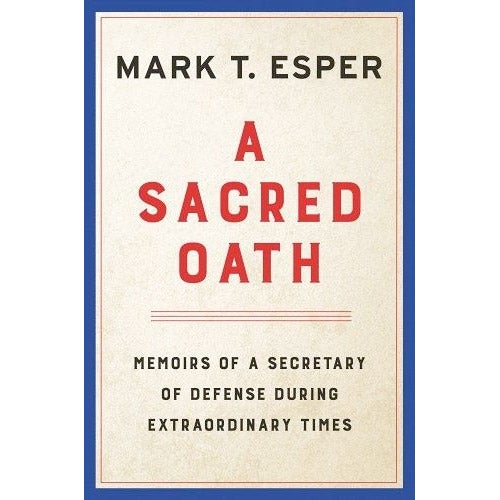I felt a pang of pity hefting Mark Esper’s A Sacred Oath, his account of the 38 months he spent working for the Trump administration, first as the secretary of the Army and then as the secretary of defense. All Esper wants is for the world to know that he launched a number of laudable, dull initiatives designed to “modernize the U.S. military, rebalance our forces around the world, reform the Department of Defense, and focus on China” as America’s global rival. A veteran of the Gulf War with a résumé balanced between government and the corporate world (mostly defense contractors), Esper comes across as the quintessential high-level bureaucrat, the kind who likes to talk about how his education at West Point instilled “timeless values” that provide him with a “moral, ethical, and professional compass” that has guided him to this day.
But why has a peacetime defense secretary been given 700 intermittently interesting pages to quote George Marshall on leadership? The back cover of A Sacred Oath cuts to the chase. “ ‘Can’t you just shoot them? Just shoot them in the legs or something?’ he asked,” reads the excerpt printed there, taken from one of the more shocking and well-publicized incidents in the book. Trump, obsessed with the idea that the civic unrest sparked by the murder of George Floyd in 2020 made him look “weak,” floated the idea of the National Guard firing on the protesters in D.C., the majority of whom were peaceful. It didn’t happen, obviously, but Esper found the moment “surreal.” He had to talk the president out of this outrageous and criminal idea even as he was trying to talk Trump out of sending 10,000 active troops to control the crowd.
Whatever Esper wants to tell us about the fine men and women of “the force,” his publisher knows that for readers this takes a very, very distant back seat to the Trump tea he’s got to spill. People want to know all the crazy shit the president tried to do before being distracted or jollied out of it by Esper and the rest of what national security adviser John Bolton referred to as “the adults in the room.” Other crackpot ideas emanating from Trump included bombing sites in Mexico believed to be occupied by leaders of drug cartels and withdrawing all U.S. troops and personnel from South Korea—a stunt that would likely have triggered war with North Korea. But possibly the most demented suggestion Esper fended off came not from Trump but from his reptilian aide, Stephen Miller. Miller wanted to follow up a raid that killed ISIS leader Abu Bakr al-Baghdadi by severing the dead man’s head, dipping it in pig’s blood, and displaying it as a warning to other terrorists. Esper and Gen. Mark Milley, chair of the Joint Chiefs of Staff and Esper’s closest ally among the president’s top advisers, immediately shot down this Game of Thrones–style suggestion by pointing out that it would be a war crime.
There are many who condemn Esper for not revealing these incidents as soon as Trump fired him, a few days after the 2020 election. Like Bolton, he is accused of withholding scandalous information until it could be profitably deployed as PR for his book. But this argument supposes that there was any time such news might have changed anything of significance. By November 2020, it had become obvious that Trump’s base—and, therefore, the Republican politicians dependent on it for their careers—would have shrugged off anything he did, short of skewering and grilling a live infant on national television. (And even then some of them would have blamed the baby.) Furthermore, like Trump himself, his fans are dumb enough to think bombing Mexico or shooting “rioters” sounds like a pretty good idea. Was Esper—most likely under the direction of his publisher—motivated by self-interest in holding back this dirt? Sure, and that makes his high-minded talk about duty and values ring a bit hypocritical. But was the dirt itself capable of changing the course of history? Nah.
By now we’ve reached the late decadent phase of the Trump administration memoir, and his handful of scoops aside, Esper doesn’t have that much to add. Like many other former White House aides, he saw Trump demonstrate that he was completely unprepared for the job of running the nation and largely ignorant of and indifferent to such principles as the rule of law and the sequestering of the military from politics. Perhaps the most insightful observation Esper makes in A Sacred Oath is this: “Trump, for all of his reputation as a decisive executive who didn’t hesitate to fire people, rarely worked that way” when a controversial move was proposed. This, along with his frantic fear of being perceived as “weak,” betrays just how weak a man Trump is. “He mused,” Esper writes. “He suggested. He complained. He fumed. It was almost as if he didn’t really want to own a decision as extreme as the one he was suggesting. He was waiting, it seemed, for one of us to yield and simply agree.” And of course, whatever he told anyone to do he could always lie about later. Trump thought, idiotically, that he could simply deny firing Tomahawk missiles into Mexico and that would be an end to it—as if anyone else besides the U.S. military could possibly be responsible.
Esper argues that without Cabinet members and aides like himself and Milley, Trump would have been surrounded exclusively by yes men whose disregard for the law and Constitution mirrored his own. The argument that government bureaucracy at home and abroad prevented the Trump administration from becoming even more of a catastrophe has merit, and even Esper’s critics agree that he probably helped keep the nation out of any number of wars. Esper describes his 18 months as secretary of defense as perpetually interrupted by the need to put out fires set by those Trump toadies. Chief among these was Robert O’Brien, who succeeded Bolton as national security adviser and was forever currying favor with Trump and his strongman fetish by advocating the use of extreme military force in any situation.
Another regular antagonist was White House chief of staff Mark Meadows, who, to judge by the many Trump administration memoirs I’ve read, may be the most disliked Trump aide. At one point, Meadows called Esper up to scold him for stealing the spotlight by announcing an ambitious plan to beef up the Navy’s fleet, shouting, “Who are you to make a major announcement about the Navy?” An exasperated Esper replied, “I’m the goddamn secretary of defense!” Esper takes evident pleasure in describing how red Meadows’ face would turn any time “others challenged him or stumped him,” and who can blame him?
The Trump White House ran on pettiness and spite, and so should Trump administration memoirs. There isn’t enough of this in A Sacred Oath, but Esper can dish it out when he deigns to. He really didn’t like Stephen Miller, whom he describes as “a slight, unremarkable person with a deadpan gaze that suggested a real lack of humor or warmth.” When Miller insisted that a quarter of a million troops be dispatched to the southern border to deal with an alleged caravan of migrants, Esper laughed at first, assuming Miller was joking. He wasn’t, and worse yet, Miller had been conferring with Homeland Security about this, “plotting administration actions with a separate federal department” in a fashion that would be “fanciful and out-of-bounds” in a normal presidency. “The U.S. armed forces,” Esper replied as he stared into Miller’s “vacant eyes,” does not have “250,000 troops to send to the border for such nonsense.”
A Sacred Oath: Memoirs of a Secretary of Defense During Extraordinary Times
By Mark T. Esper. William Morrow.
Slate receives a commission when you purchase items using the links on this page. Thank you for your support.
An interesting tidbit Esper mentions in A Sacred Oath is that Miller could push Attorney General William Barr’s buttons “in ways no one else could.” Barr, a frequent Esper ally, once blew up at Miller during a discussion of the demonstrations of 2020, when Miller claimed the nation’s “cities were burning down” and that the Insurrection Act must be invoked to “save our country from antifa.” (Barr, Milley, and Esper opposed this measure as counterproductive and way over-the-top.) “You don’t know what the hell you’re talking about,” Barr shouted at Miller. This passage sent me to Barr’s own memoir, One Damn Thing After Another, to see how the attorney general himself described this memorable confrontation with Miller. But the index for Barr’s book contains only a single entry for Miller, leading to a page where Barr briefly recounts a time when the president denied giving Barr an order, and then, when Barr corrected him, Miller backed Barr up. It gave me pause. In the fine art of getting back at former colleagues one despises, is it better to freely dish on them in your memoir, the Esper route? Or is it not a Jedi move to simply treat them as if they were too insignificant to discuss at all, except to remind the boss of the one time they contradicted him? Barr was a disastrous attorney general, but when it comes to throwing shade, he has few peers.
The good dish in A Sacred Oath is sparse, but at least Esper is forthright in expressing his opinion that Trump was not qualified for the office of president. What he’s less honest about is how Trump rose to power as a result of “traditional” Republicans like himself—a self-described “fiscal conservative, social moderate, and defense hawk who believed in free but fair trade, protecting the environment[!], legal immigration, and limited government.” Unable to win enough votes on the unpopular policies the party leadership actually believed in (no taxes on the rich and no restraints on big business), the GOP fomented a culture war to form an alliance with the sort of angry, low-information populists who adore Trump. Now Republicans like Esper are his hostages. By the time Esper took a job in Trump’s White House, determined to moderate the president’s worst impulses, his prudence was way too little, and far too late.

